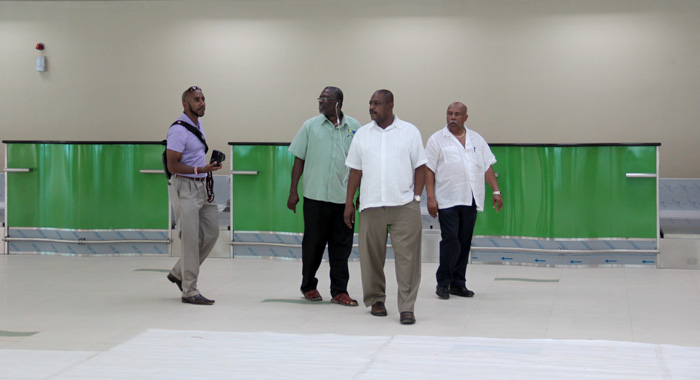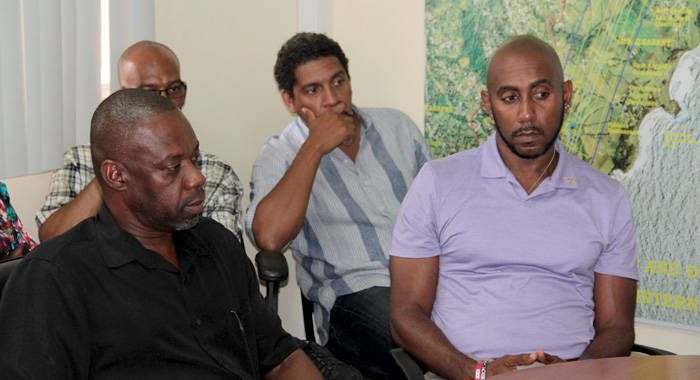Head of the Tourism Authority, Glen Beache, says one or two airlines have already indicated how many flights they would like to make to Argyle, once the airport is up and running.
But Beache, when asked at the press conference on Friday where he made the announcement, declined to name the airlines.
“I am in a position to say so, but I won’t say so because competition is also fierce out there and our negotiation with the airlines has to keep within a certain pathway and so and they don’t want their competition to know if they are interested and so on. But I can assure you that it is two of the bigger ones,” he told a press conference with Prime Minister Ralph Gonsalves after a meeting with airport stakeholders.
The EC$729 million airport has missed completion deadlines annually since 2011.
But Rudy Matthias, head of the state-owned firm responsible for its construction, told reporters at the media briefing on Friday that he is confident that the airport will be completed by June.
Beache said the Tourism Authority continues to speak with airlines out of Europe, North American, the Caribbean and Latin America about flying to Argyle.
“The interest is there, as I have said before. They’ve requested some technical information, which we have given to them, they continue to monitor the situation, we continue to provide them will all the information that is needed,” he said.
He went on to say that airlines have made a decision.
“There are one or two of them that have already run their numbers and have indicated to us exactly how many flights weekly they would like to do once we are up and running, so we are very happy about that.
“And we continue negotiate with all of them. One or two others also that have interest but they have some internal things that are going on within their airlines,” he said.

In this category, he mentioned Air Canada’s subsidiary, Rouge.
“… and they are looking at that airline coming into the Caribbean instead of air Canada. So they are looking at some internal things to see what fits their model. We have also spoken to some other Caribbean countries in terms of tag flights,” Beache said.
To illustrate, he suggested that a flight from the United Kingdom would first land at Argyle before going on to Tobago.
He said British Airways does one or two of those with St. Lucia and Tobago, and Virgin probably does one with Antigua.
“So we are looking at that to see what direction is best for us and also for the airlines. Obviously, if we do a tag flight, it minimises what we have to put in with the airlines, because it will be joint in terms of revenue guarantee and marketing funds…
“The interest is there, we are just waiting for the go ahead to make sure everything is set and, as I’ve told the airlines, it’s of benefit to them, because whoever gets into St. Vincent and the Grenadines first are the ones that are gonna benefit hugely.
“I mean, it’s one of the last destinations to put in an international airport and those that have run their numbers are very pleased with what they have seen and what we can, what they project will be a very successful relationship between St. Vincent and the Grenadines and themselves.”
Regarding his declining to name the airlines that have indicated how many flights they hope to make weekly to Argyle, Beache was told that one would imagine that an airline with such a plan would have already begin to market a new destination if they are planning to fly there within the next 12 months.
“It would be joint marketing between the airlines and ourselves. That’s part of the negotiations that are gonna take place. It is not only a matter of marketing the destination, it is a matter of setting up the tour operators to promote those packages, working with those private stakeholders in St. Vincent and the Grenadines to make sure we have everything coming together. But, yeah, the marketing is gonna be very important, and once we do our marketing properly, i can’t see us really having to do much in terms of revenue guarantee,” Beache said.







Well Gonsalves looks like he has discovered his willy has fallen off.
you only have to look at the glum disappointment on their faces in all the photo’s to see the truth.
I doubt very much that any airline that has run through the numbers are pleased with what they have found in SVG. Anyone that looks at the numbers will find that the Caribbean is a very expensive area. All the companies I have heard have said they are not really interested in going to the Caribbean because it is very poor value for the cost. Saint Vincent is even more expensive and of less value than these other places. Cuba will be different. Cuba is already expanding at ten-times the rate of SVG. Most of the tourists I have talked to say they will not return to Saint Vincent because they were expecting low costs, instead they got high costs and low value. Thank this to our race to raise taxes as high and fast as possible to pay for the financial mismanagement.
Sheer nonsense from Beache.
So why are so many airlines announcing — even before they have received official approval from that country — how eager they are to fly to Cuba? And why is Cuba saying nothing about this?
It is seems like little SVG is turning the way the travel industry actually works all around the world — shouting from the rooftops that they are planning to fly to or build a hotel in a different destination — on its head.
What Beache and the Prime Minister have always been trying to tell us that members of the travel industry — hotels and airlines — that spend tens of millions of dollars every year advertising themselves don’t want to take advantage of the free publicity that yet another country wants their business!
The last thing in the world the travel industry want is anonymity.
Something I and others have generally ignored in discussions of the airport and its tourist-generating implications are the issue of legal and illegal concessions.
First, generous concessions will have to be given to any international airlines willing to land at Argyle. At the extreme this would involve waiving all landing and other fees that airlines generally have to pay for the privilege of using and airport and its facilities together with an agreement to pay for all empty seats.
No government-owned airport would be willing or able to accept these terms unless those landing would be wealthy people who spent so much on their visit say by gambling at government-owned casinos that these terms would be more than worth it. In any event, the concessions granted would be an additional cost, perhaps the highest cost, of running the airport itself.
Second, any new foreign hotels and resorts (locals would hardly have the tens of millions to build such facilities) would be granted long-term land leases at peppercorn rates and would be given duty-free import and income-tax exemptions lasting up to 20 years. Again, this would adversely impact the value-added rationale of the whole enterprise. in our case, it would make it far more difficult to pay for the airport and its operation and upkeep.
So why do governments, especially poor underdeveloped or developing countries, accede to such quasi-extortionary concessions? Three reasons: jobs-jobs-jobs.
High unemployment is a huge problem in such countries. Helping create new jobs is also a good way to win loyal voters.
There is also the less obvious but equally common motive of concessions going both ways. In the Caribbean alone, there are many ways for elected and unelected government functionaries, high and low, to readily benefit financially from negotiating contracts with outside tourism developers. This is illegal, of course, but the greed of too many politicians and their bureaucrats has no limits.
At the end of the day, it is easy to see why governments in poor countries like our own are so eager to climb on the tourism bandwagon regardless of whether their people and country actually benefit in the process.
We’re being fooled every time there’s a press conference about the Large Argyle Airport (LAA)…the cart is in front the horse with this waste in major capital expenditure….did the Administration considered the opportunity cost of 729 million? Clearly someone needs 21st century Economics lessons